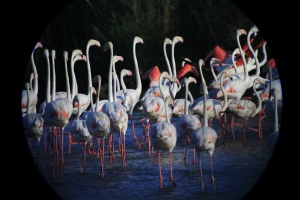The premiére conservation congress of the year, ICCB, was held in the beautiful Montpellier, France this year, and I attended for my 4th congress, and first as a postdoctoral fellow to present my work on cost-effective monitoring. It was as usual a crazy week, and I very much appreciated the opportunity to catch up with colleagues from around the world, meet new ones, and see some flamingos!
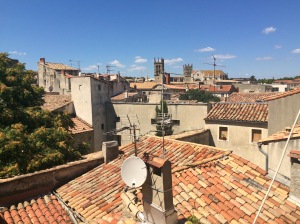
I somehow missed the tweet up, but I did manage to meet at least three people I have only really talked to on twitter, which was fantastic! It was also excellent to finally meet a few colleagues I have only met digitally including the inimitable John Woinarski (plenary speaker and award winner who had participants in tears as her urged them not to give up) from my home shores. Now finally back on home soil (thank goodness) with the rest of Oceania’s large contingent, I wanted to share reflections from the conference. If you missed my presentation, the slides are available on FigShare HERE 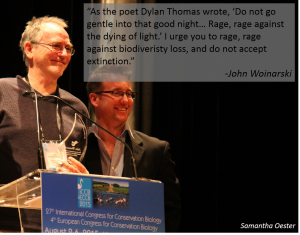
Highlights for me included a brilliant double session chaired by Mike Hoffman and Richard Young (Storify HERE), a packed session on Evidence based Conservation led by Jessica Walsh and Bill Sutherland, and seeing much more interdisciplinary science happening. As both and evaluation expert and an ecologist increasingly collaborating with social scientists, these were obviously right up my alley, but as Oceania board member and awesome social scientist Carina Wyborn said, the diversity of presentations, participants, and research themes was excellent, reflecting the evolution of the society in more than just a bunch of biologists.
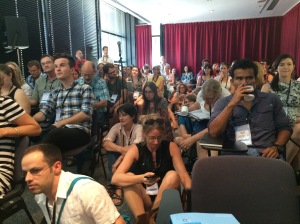
Hopefully, this is something that will be reflected in a name change soon. Why a name change? When current SCB president James Watson first suggested this to me several years ago, my reaction was that it would be a brand risk, but after a few years of being part of the society i realised that the risk is rather, the isolation of those who could make the society truly interdisciplinary.
I also really enjoyed the Smith Fellows lunchtime session on failure with the fantastic Emily Darling and Diogo Verissimo (ecologist turned marketer who i only knew from twitter previously), where I was able to engage in meaningful and engaging discussion with new and interesting people. Some key reflections for me were that failure is part of the learning process. If we don’t have space to fail, then conservation science will neither innovate, nor progress, and upcoming young and early career scientists (like me!) will be trapped doing low-risk work. This resonated with me as I reflected on a) the business world, in which some of the most successful people are those who failed a lot, early – like Elon Musk and Richard Branson; and b) some recent experiences I have had with government agencies, who are unwilling to fund innovative forward looking work, preferring to fund low risk incremental work. This isn’t enough, and we need a game changer. So thanks Smith Fellows for helping me shift my perspective.
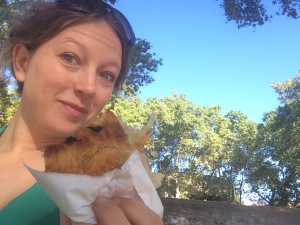
There are always lots of things to improve, but one that came up a few times – reflected upon by Diogo on Conservation Bytes, was presentation format. One strength of this years conference was the number, diversity, and quality of posters, but the space allocated was cramped and didn’t really do them justice. Coupled with them being at the end of the day, with no accompanying enticement by refreshment, this made them less successful than they could have been. Unlike Diogo, I still think that the oral presentation is incredibly valuable – I for one would not have developed my communications skills without opportunities like this to present to my peers – not just my lab and friends at home. It also offers a lot of untapped opportunities for mixed media communications with the public (see thoughts below). Still, there seems to remain a stigma around posters – which certainly are sometimes more effective. How do we change up the format to make it work better? I think we took a step backwards on speed talks – tacking them on the end of sessions instead of the excellent full speed session model with round tables at the end for all the participants – I vote to bring this back, and have more speed talks – they are certainly a bigger challenge to do well, and they leave more time for interesting and meaningful discussion.
On the topic of presentations, there certainly were some terrible presentations during the conference. I racked up quite a few ‘Bad presentation BINGO’ moments, which is rather disappointing given the level of competitiveness for presenting at the conference.
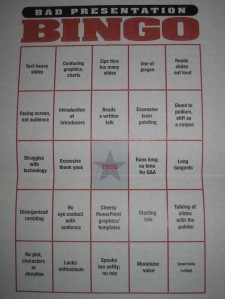
Did you know that around three quarters of symposiums and abstracts for this conference were rejected? So how do we balance the challenges of quality, equity, diversity, and skill development. Selection on pure quality would mean minimal student presentations, and likely, fewer ESL presentations. I don’t have a solution here, but do potentially have something that could help with the poor presentations: Slide Swap & ‘Pimp my Slide’. Slide swap is easy, simply provide a mechanism to register to swap slides with someone, or provide review if you’re too disorganised to send yours in, and get some peer feedback. ‘Pimp my slide’ would be a workshop or worskhops dedicated to improving presentation quality (including deleting your 2000 word essay from them) – simple stuff, but not a set of skill development everyone has equal access to. Stacy Jupiter and Rebecca Weeks (oceania board members extraordinaire), offered something similar for Pacific students at the most recent Oceania conference in Fiji, which including peer evaluation and student networking, and it was a resounding success!
Poor internet connectivity, lack of video, and no dedicated social media person seemed to me to be huge missed communications opportunities – but at least there wasn’t a twitter ban like at ESA (?!), or total network meltdown like at times during World Parks Congress! Often it seems that these are the result of conference venues failing to provide core services, or overcharging for them – how about some creative contract work? For instance, half the payment is contingent on delivery of key services – such as effective internet in all parts of the conference centre, for all participants. Alternatively, some strategic planning: For instance: what if all the twitterati, bloggers, etc. could pre-register to receive a SIM card with local data when they arrived at the conference? or everyone? You could pay for it with the savings from overpaying the conference centre… or I’d certainly pay $10 more to ensure effective scicomm!
I had some intriguing conversations about these missed opportunities post-conference with the Oceania board – who are cooking up some creative structures for the Oceania conference, and about videos and mixed media with Mike Mascia (pres in waiting) and Morena Mills – who are trying to figure out how to understand what makes conservation go viral, and others. I look forward to seeing the Regions bring their local flair to the conference series next year and ramp up the communications creativity!
Thanks again to the wonderful organisers of ICCB ECCB 2015, and hopefully see you at the Oceania regional conference soon – proposals for symposia are being accepted now!
